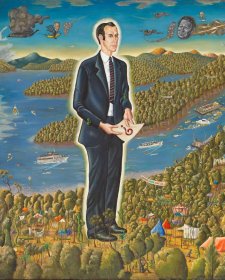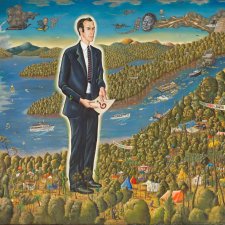Bob Brown (b. 1944), environmentalist, doctor and former politician, is an environmental campaigner and former Parliamentary Leader of the Australian Greens. Born in Oberon, New South Wales, Brown studied medicine at Sydney University and practiced medicine in Canberra, Darwin, Alice Springs and London. In 1972 he moved to Tasmania, where he worked as a general practitioner in Launceston. His passion for the Tasmanian wilderness was sparked by a rafting trip down the Franklin River in 1976, the same year that he became a founding member of the Wilderness Society. From then until 1983 he famously led the campaign against proposed dam works on the Franklin River, during which he was arrested and gaoled. The river was subsequently preserved with a World Heritage Listing. In 1983, he began a decade in the Tasmanian House of Assembly as the Member for Denison. He was elected to the Federal Senate as a member of the Tasmanian Greens in 1996 and later joined West Australian Greens Senator Dee Margetts in founding the Australian Greens. At the 2001 Federal election Brown was re-elected to the Senate with a greatly increased vote. Brown oversaw the emergence of the Greens from a fringe to a mainstream political force and remains one of the most-recognised Australian political figures, known for his outspokenness on the environment as well as human rights and social justice issues. He has written several books including his memoirs Memo for a Saner World (2004) and Optimism (2014). After stepping down as leader of the Greens and retiring from the Senate in 2012, he established the Bob Brown Foundation, a not-for-profit organisation supporting environmental causes.







